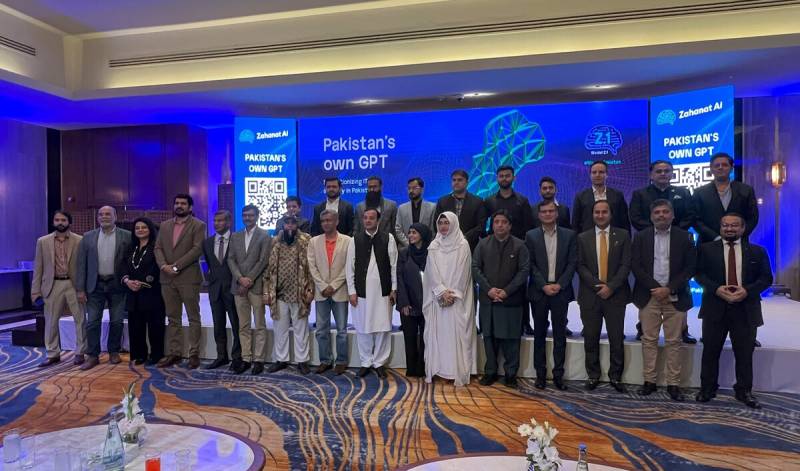Pakistani tech firm unveils country's first locally-developed GPT platform

Stay tuned with 24 News HD Android App

Pakistani tech company Data Vault has unveiled the country’s first locally developed generative pre-trained transformer (GPT) platform, named Zahanat AI, marking a major milestone in Pakistan's artificial intelligence (AI) landscape. The announcement, made on Thursday, showcases a significant advancement in AI innovation within the country.
Zahanat AI is a text-based generative AI model designed to facilitate human-like conversations, answer questions, and assist in a variety of domains. According to Data Vault, the initiative aims to bolster Pakistan’s AI capabilities by developing models that are specifically trained to meet local needs.
Syed Muhammad Yahya, Chief Technology Officer (CTO) of Data Vault, explained at the platform’s launch in Islamabad that the model is tailored to Pakistani culture and context. “The problems and solutions it addresses are specifically aligned with our local environment,” he said. “So, you can consider it a local model.”
Generative AI systems like Zahanat AI are capable of producing content such as text, images, audio, and video. Similar to other large language models (LLMs) like ChatGPT, DeepSeek, and Meta-AI, it is trained on extensive datasets to understand and generate human-like text.
The Zahanat AI model supports English, Urdu, and regional languages, with plans to expand its linguistic capabilities further. It is designed to handle a wide range of topics, including healthcare, mathematics, coding, and historical queries.
One of the key differentiators of Zahanat AI is that it is hosted and trained locally within Pakistan, making it uniquely equipped to address issues relevant to the country. “This is hosted inside Pakistan,” Yahya emphasized. “It’s a local model, and the problems and solutions it provides will be tailored to our culture and environment.”
Privately funded through friends and family, Zahanat AI is built on Meta’s Large Language Model Architecture (LLaMA), boasting 1.5 billion parameters and following an open-source approach similar to that of DeepSeek. Yahya revealed that the platform’s development took approximately six to eight months, with a multi-GPU setup using 12-15 GPUs.
Currently, the GPT platform is available in Pakistan, with Data Vault planning to launch its mobile app soon. This development coincides with Pakistan’s efforts to finalize its first national AI policy, aimed at encouraging innovation through public-private partnerships. Dr. Aneel Salman, who is overseeing the policy’s creation, highlighted that the upcoming AI policy is designed to foster local entrepreneurship and innovation. “Our AI policy is very liberal. It supports the local ecosystem and entrepreneurs,” he stated, adding that the policy will likely be unveiled after Eid or within a month.
Dr. Salman also raised concerns about the cybersecurity risks posed by foreign AI models. “While GPT models like ChatGPT and DeepSeek are widely used, there are risks in uploading personal information to foreign platforms,” he explained. “You don’t know how that information will be processed and used.”
During the launch event, a demonstration of Zahanat AI was presented, showcasing its ability to respond to queries related to healthcare and mathematics. However, when asked about freelancing trainer Hisham Sarwar, who was present at the event, the model initially provided incomplete information, later offering inaccurate details.
Dr. Salman acknowledged these limitations, noting that similar challenges were encountered with other AI models at the start. “When ChatGPT was first released, it had its own issues, and DeepSeek also faced challenges during testing,” he said. “I’m not suggesting that Zahanat AI is perfect, but as we move forward, we’ll see improvements with new versions, like Z1, Z2, and Z3.”
Despite the breakthrough, experts agree that public adoption will be crucial for the success of Pakistan's GPT model. Prof. Dr. Yasar Ayaz, chairman of the National Center of Artificial Intelligence (NCAI), emphasized the importance of widespread use of Zahanat AI. “To prevent Zahanat AI from facing the same fate as other past initiatives, we need to integrate its technology into our daily lives,” he said. “It’s also vital for companies like Zahanat AI to collaborate with innovators and researchers in Pakistan, working together to create groundbreaking solutions that can transform the AI landscape in the country.”
